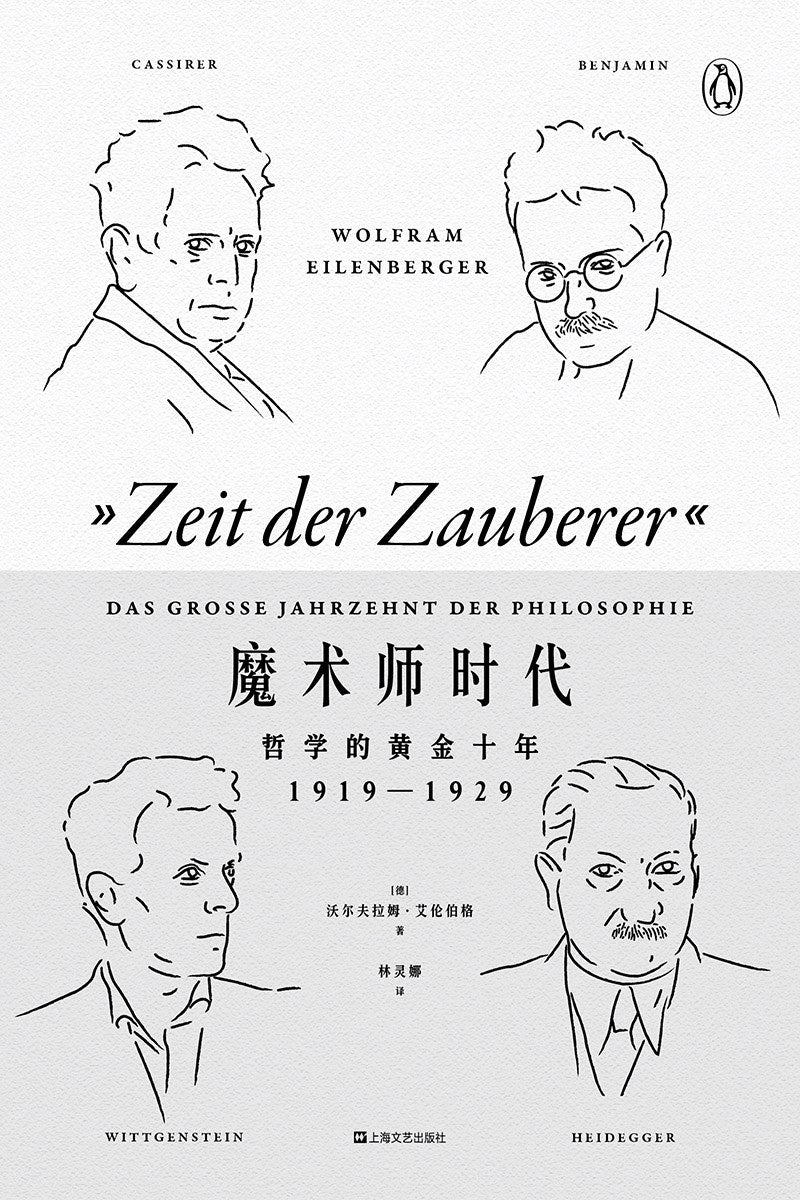1
/
of
1
Magician Era
Magician Era
Philosophy's Golden Decade: 1919-1929
[German] Wolfram Ellenberger Lin Lingna 译Regular price
$22.99 USD
Regular price
$22.99 USD
Sale price
$22.99 USD
Unit price
/
per
Low stock
Couldn't load pickup availability
About Book
About Book
*The Guardian's 2020 Book of the Year
*The Economist's 2020 Book of the Year
*2020 New York Times Book of the Year Recommendation
The 1920s was a period between colorful life and economic crisis, a period when World War I had just ended and Nazism was brewing, and a golden age of German philosophy.
Martin Heidegger's career soared, and he found love with Hannah Arendt. Walter Benjamin, stumbling through life, fell head over heels in love with a Latvian anarchist on Capri, a love affair that catapulted him into revolutionary status. The brilliant Wittgenstein, the billionaire's son and hailed as the God of Philosophy at Cambridge, found himself living in utter poverty as a rural primary school teacher in remote Upper Austria. Finally, there was Ernst Cassirer, who, a few years before moving to a middle-class district in Hamburg, experienced firsthand the rise of anti-Semitism.
This book not only traces the diverse daily lives, emotional experiences, and intellectual states of Heidegger, Benjamin, Wittgenstein, and Cassirer between 1919 and 1929, but also strives to contrast the ideas of these four philosophers, showcasing their respective responses and responses to the fundamental questions of their time. Through the author's masterful narrative, we discern the roots of our present world in the life paths and revolutionary ideas of these four exceptional philosophers. Looking back at the 1920s is both insightful and a wake-up call.
—
"This book depicts the period from 1919 to 1929 in a masterful narrative style. Heidegger, Wittgenstein, Benjamin, and Cassirer achieved worldwide significance. Together, they painted a breathtaking intellectual landscape, leaving behind four different life trajectories. Thus, a philosophical constellation emerges in a broad perspective in the period before and after the shadow of the Second World War." - Rüdiger Safranski
◆ “It will be difficult to see a book this good for a long time.” - Micha Brumlik, Daily
◆ "It combines biography and intellectual history with admirable narrative skills." - El País
◆ “Like a novel, it will inevitably lead the reader into an extremely complex discussion.” —La Repubblica, Italy
*The Economist's 2020 Book of the Year
*2020 New York Times Book of the Year Recommendation
The 1920s was a period between colorful life and economic crisis, a period when World War I had just ended and Nazism was brewing, and a golden age of German philosophy.
Martin Heidegger's career soared, and he found love with Hannah Arendt. Walter Benjamin, stumbling through life, fell head over heels in love with a Latvian anarchist on Capri, a love affair that catapulted him into revolutionary status. The brilliant Wittgenstein, the billionaire's son and hailed as the God of Philosophy at Cambridge, found himself living in utter poverty as a rural primary school teacher in remote Upper Austria. Finally, there was Ernst Cassirer, who, a few years before moving to a middle-class district in Hamburg, experienced firsthand the rise of anti-Semitism.
This book not only traces the diverse daily lives, emotional experiences, and intellectual states of Heidegger, Benjamin, Wittgenstein, and Cassirer between 1919 and 1929, but also strives to contrast the ideas of these four philosophers, showcasing their respective responses and responses to the fundamental questions of their time. Through the author's masterful narrative, we discern the roots of our present world in the life paths and revolutionary ideas of these four exceptional philosophers. Looking back at the 1920s is both insightful and a wake-up call.
—
"This book depicts the period from 1919 to 1929 in a masterful narrative style. Heidegger, Wittgenstein, Benjamin, and Cassirer achieved worldwide significance. Together, they painted a breathtaking intellectual landscape, leaving behind four different life trajectories. Thus, a philosophical constellation emerges in a broad perspective in the period before and after the shadow of the Second World War." - Rüdiger Safranski
◆ “It will be difficult to see a book this good for a long time.” - Micha Brumlik, Daily
◆ "It combines biography and intellectual history with admirable narrative skills." - El País
◆ “Like a novel, it will inevitably lead the reader into an extremely complex discussion.” —La Repubblica, Italy
Publication Date
Publication Date
2019-08-01
Publisher
Publisher
上海文艺出版社
Imprint
Imprint
Arts and Culture eons
Pages
Pages
480
ISBN
ISBN
9787532172979
share

